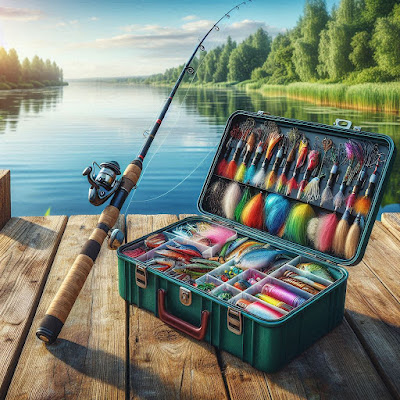Why Fishing Is the Perfect Hobby for Beginners: Your Gateway to Nature's Greatest Stress Relief
#FishingTips #BeginnerFishing
When life feels overwhelming, millions of people worldwide turn to a simple yet profound activity: fishing. More than just catching fish, this timeless pursuit offers a unique blend of relaxation, adventure, and personal growth that makes it one of the most rewarding hobbies you can start today.
The Surprising Benefits of Fishing That Go Beyond the Catch
Fishing isn't just about what's on the end of your line—it's about what happens to your mind and body while you're waiting. Research has shown that recreational fishing is associated with lower levels of perceived stress, making it a natural antidote to our fast-paced modern world.
America's 52.4 million anglers contribute $148 billion in economic output and support 945,500 jobs across the entire country, demonstrating just how popular this hobby has become. But the real value lies in the personal benefits: improved mental health, connection with nature, quality time with family and friends, and the satisfaction of learning a skill that can last a lifetime.
The physical benefits are equally impressive. Fishing gets you outdoors, provides gentle exercise, and exposes you to vitamin D from sunlight. Plus, if you're successful, you'll enjoy the nutritional benefits of fresh fish rich in omega-3 fatty acids and protein.
Best Types of Fishing for Complete Beginners
Freshwater Pond and Lake Fishing
Start here. Seriously. Pond fishing is the perfect training ground for beginners because it's accessible, affordable, and forgiving. You'll learn basic techniques without the complexity of currents, tides, or expensive equipment. Target species like bluegill, bass, and catfish are abundant and relatively easy to catch.
Bank Fishing at Local Rivers
Once you've mastered still water, try moving water. River bank fishing teaches you to read currents and adapt your techniques. Many rivers have public access points and offer diverse fish species to keep things interesting.
Pier and Shore Fishing (Saltwater)
If you live near the coast, pier fishing provides an excellent introduction to saltwater angling. The infrastructure is already there, you don't need a boat, and pier communities are incredibly welcoming to newcomers.
Your Complete Beginner's Fishing Kit
Essential Gear (Under $100 Total)
- Rod and Reel Combo: A 6-7 foot medium-action spinning rod with a 2500-3000 size reel
- Fishing Line: 10-12 lb monofilament for versatility
- Hooks: Size 6-10 circle hooks for live bait, size 1-4 for larger fish
- Sinkers: Split shot and egg sinkers in various weights
- Bobbers: Red and white round bobbers for visibility
- Pliers: For hook removal and line cutting
- Tackle Box: To organize your growing collection
- Bait: Live worms, artificial worms, and small spinners
Nice-to-Have Additions
- Folding chair for comfort during longer sessions
- Cooler with ice packs for keeping fish fresh
- Landing net for easier fish handling
- Basic first aid kit
- Sunscreen and hat for protection
Getting Started: Your First Fishing Trip
Choose a local pond or lake with easy access and known fish populations. Many state parks offer fishing opportunities with equipment rentals. Start with simple techniques like bobber fishing with live worms—it's effective and builds confidence.
Nearly 80 percent of recreational fishing trips in the U.S. included between two and five people in 2023, so don't hesitate to invite friends or family. Fishing is inherently social, and experienced anglers love sharing knowledge with newcomers.
Learning Resources and Community
Join local fishing clubs, follow YouTube channels dedicated to beginner fishing, and don't underestimate the value of talking to other anglers. The fishing community is remarkably welcoming and eager to help newcomers succeed.
Consider taking a basic fishing class through your local parks and recreation department. Many offer equipment and instruction, making it easy to try before you invest in your own gear.
The Philosophy of Fishing
As Mark Twain wisely observed, "Do not tell fish stories where the people know you. Particularly, don't tell them where they know the fish." This humor captures something essential about fishing culture: it's about more than just the fish.
Fishing teaches patience, observation, and respect for nature. It's a hobby that grows with you, offering endless opportunities to learn new techniques, explore different waters, and connect with the natural world in meaningful ways.
Making the Commitment
Starting any new hobby requires commitment, but fishing is particularly forgiving for beginners. You don't need perfect technique or expensive equipment to catch fish and enjoy the experience. Focus on learning the basics, respecting the environment, and enjoying the process rather than just the outcome.
The best time to start fishing was yesterday. The second-best time is today. With minimal investment and maximum potential for enjoyment, fishing offers a lifetime of adventure, relaxation, and personal growth that few hobbies can match.
Whether you catch your limit or go home empty-handed, you'll return from each fishing trip with something valuable: peace of mind, fresh air in your lungs, and stories to tell. In our increasingly digital world, fishing provides a tangible connection to nature and ourselves that's impossible to replicate indoors.
Ready to cast your first line? Your new favorite hobby is waiting at the nearest body of water.





Comments
Post a Comment